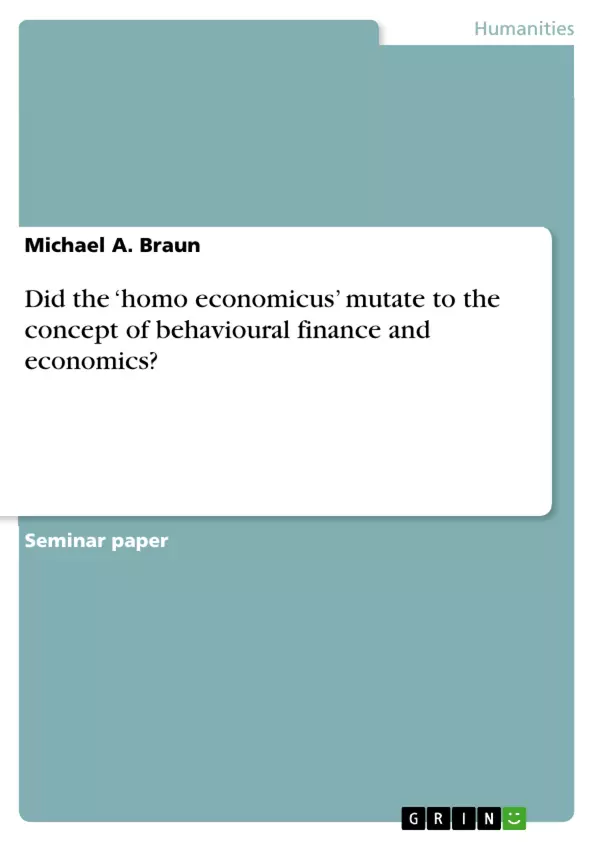Former classic economic theories mainly strengthened the concept of the ‘homo economicus’, who strongly behaves economical and rational. Nowadays however, some argue this supports not the reality, and so academic research progressed. For this, laureate Kahneman et al developed the prospect theory which is assumed to describe people’s economical behaviour better than traditional theories.
Therefore the essay elaborates on the concept of behavioural finance and econom-ics as well as it checks, whether the homo economicus has mutated to this. How-ever, although there is criticism, the hypothesis is humans are bounded rational and therefore only conditioned able to be described as homo economicus.
To gain insight, a brief introduction on theory, homo economicus and recent ob-servations of efficiency in human action and rationality is given. Later the concept of behavioural finance and economics is brought in and findings in human behav-iour are discussed together with examples from heuristics, economical framing and anomalies. Finally, an assessment of essay and hypothesis sums all up.
Inhaltsverzeichnis (Table of Contents)
- Introduction and academic method
- Classical theory in the context of new findings
- The evolution of an idea
- Basic observations and methods
- A new succeeding concept
- Behavioural finance and economics
- Critics on behavioural finance and economics
- Prospect theory: main findings in human behaviour
- Heuristics
- Loss aversion
- Gambler's fallacy
- Self-serving bias / Self-attribution Bias
- Framing (economics)
- Mental accounting
- Anchoring
- Anomalies
- Endowment effect & status quo bias
- Life cycle & inter-temporal consumption
- Overoptimism & wishful thinking
- Heuristics
Zielsetzung und Themenschwerpunkte (Objectives and Key Themes)
This essay aims to explore the concept of behavioural finance and economics, examining whether the traditional model of 'homo economicus' has evolved into this new framework. The paper will analyze the limitations of the classical economic model and its reliance on rationality, highlighting the findings of behavioural finance and economics that suggest human decision-making is often influenced by emotions, biases, and heuristics.
- Evolution of economic thought from classical models to behavioural finance and economics
- Impact of cognitive psychology on economic decision-making
- The role of heuristics, framing effects, and anomalies in human economic behaviour
- Limitations of the 'homo economicus' model in light of empirical observations
- Exploring the concept of bounded rationality and its implications for economic decision-making
Zusammenfassung der Kapitel (Chapter Summaries)
The introduction sets the stage by outlining the limitations of the traditional economic model, which assumes individuals are perfectly rational and self-interested. It introduces the concept of behavioural finance and economics as a more realistic approach that acknowledges the influence of psychology and emotions on economic decision-making.
Chapter 2 delves into the historical evolution of economic thought, tracing the shift away from psychology in the neo-classical period and the re-emergence of psychological considerations in the development of behavioural finance and economics. It explores key observations and methodologies used in this new field, including experimental studies and brain imaging techniques.
Chapter 3 explores the key findings of prospect theory, a central framework within behavioural finance and economics. It examines various heuristics, framing effects, and anomalies that influence human decision-making, providing insights into the ways in which people deviate from purely rational behavior.
Schlüsselwörter (Keywords)
The primary keywords and focus topics of this work include behavioural finance, behavioural economics, homo economicus, bounded rationality, prospect theory, heuristics, framing effects, anomalies, cognitive psychology, economic decision-making, and experimental economics. These terms represent the core concepts and research themes explored within the context of understanding how humans make economic choices.
Frequently Asked Questions
What is the 'homo economicus' model?
It is a classical economic concept of a human being who behaves in a perfectly rational and self-interested manner to maximize utility.
How does Behavioural Finance differ from classical theory?
Behavioural Finance acknowledges that emotions, psychological biases, and heuristics (mental shortcuts) significantly influence economic decisions, contrary to the pure rationality of classical models.
What is Prospect Theory?
Developed by Kahneman and Tversky, it describes how people choose between probabilistic alternatives involving risk, highlighting that humans value gains and losses differently.
What are some examples of cognitive biases mentioned?
The essay discusses heuristics like loss aversion and gambler's fallacy, framing effects like mental accounting and anchoring, and anomalies like the endowment effect.
What is 'bounded rationality'?
It is the idea that human rationality is limited by the information they have, the cognitive limitations of their minds, and the finite amount of time they have to make a decision.
- Citation du texte
- Michael A. Braun (Auteur), 2006, Did the ‘homo economicus’ mutate to the concept of behavioural finance and economics?, Munich, GRIN Verlag, https://www.grin.com/document/60829



